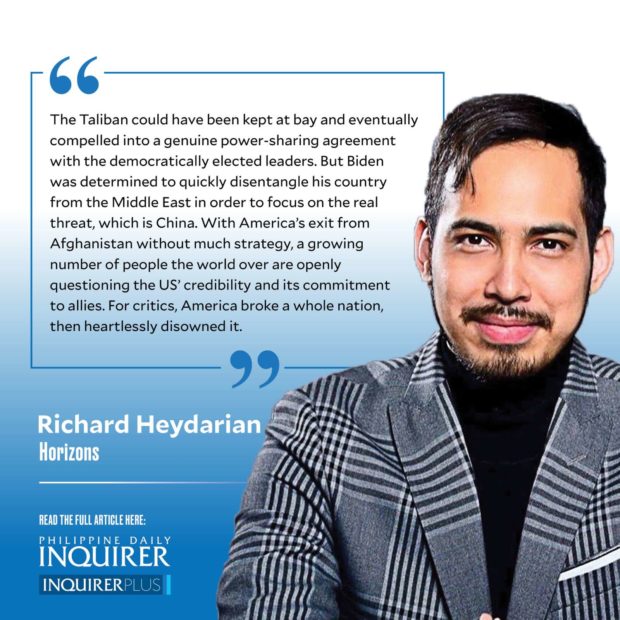“There’s going to be no circumstance where you see people being lifted off the roof of an embassy of the United States [in] Afghanistan,” declared President Joseph Biden just over a month ago. “The likelihood there’s going to be the Taliban overrunning everything and owning the whole country is highly unlikely.”
But that’s exactly what happened this weekend, as Taliban forces successfully launched a nationwide blitzkrieg that culminated in the swift and dramatic fall of Kabul. In response, American choppers and airplanes scrambled to extract their entire diplomatic corps from the country.
Former president Ashraf Ghani reportedly fled to neighboring Tajikistan in order to avoid the fate of some of his predecessors, including Mohammed Daoud Khan and Hafizullah Amin, who were assassinated amid bloody reshuffles in power.
Anticipating an eerie return to fundamentalist governance under Taliban, panic-stricken folk in Kabul began redecorating shops and streets, stripping the once-beautiful city of its newfound vibrance in recent years. Countless others tried to flee altogether, scrambling for overprized passports and flocking to overcrowded airports in order to seek refuge in neighboring Iran.
The whole tragic scene was reminiscent of America’s ignominious retreat from Saigon in 1975, as North Vietnamese communist forces seamlessly overran the US-aligned government in the South.
After 20 years of US-led war, torturous nation-building, and whimpering democratic experimentation, the Taliban now controls even more territory than it did during the Islamic Emirate of Afghanistan (1996-2001). Without a doubt, this would go down as one of the greatest strategic blunders and intelligence failures of the century, rivaling the disastrous interventions of the Soviet Union and Britain in the country in past centuries.
Was this inevitable?
As far as Biden is concerned, one more year or even a decade more of American military presence wouldn’t have made a difference, especially if “the Afghan military cannot or will not hold its own country.” For him, America has done more than its fair share of helping the Afghans’ democratic aspirations.
In Biden’s words: “America has sent its finest young men and women, invested nearly $1 trillion, trained over 300,000 Afghan soldiers and police, equipped them with state-of-the-art military equipment, and maintained their air force as part of the longest war in US history.”
Biden also correctly pointed out that his withdrawal plan was conditioned by former president Donald Trump’s haphazard “peace deal” with the Taliban last year. Shockingly, the former president didn’t even bother to include the democratically elected government in Kabul during the negotiations in Doha, Qatar, while going so far as secretly inviting Taliban leaders to an intimate retreat in Camp David.
As former US ambassador to Afghanistan Ryan Crocker pointed out, the rot “began under President Trump when he authorized negotiations between the US and the Taliban without the Afghan government in the room,” which was “a huge demoralizing factor for the Afghan government and its security forces.”
This brings us to the heart of the problem: As Gen. Wesley Clark, the former supreme allied commander of NATO, pithily put it, the unfolding tragedy is a product of “20 years of American misjudgments.”
Year after year, American troops and diplomats came in, yet few bothered to even learn the language and truly appreciate the customs and beliefs of their Afghan hosts. The upshot of this ingrained “culturally disdainful” attitude, as one expert put it, is the perennial lack of mutual trust and confidence, which was further exacerbated by Biden’s hasty exit.
Nevertheless, there was a “middle path” that could have avoided the disaster. Top military experts, including Biden’s own defense chief as well as former general David H. Petraeus, argued that the Taliban’s total victory could have been prevented had Americans maintained a residual yet decisive force to provide morale and tactical support to Afghan national forces.
In short, the Taliban could have been kept at bay and eventually compelled into a genuine power-sharing agreement with the democratically elected leaders. But Biden was determined to quickly disentangle his country from the Middle East in order to focus on the real threat, which is China.
With America’s exit from Afghanistan without much strategy, a growing number of people the world over are openly questioning the US’ credibility and its commitment to allies. For critics, America broke a whole nation, then heartlessly disowned it.


